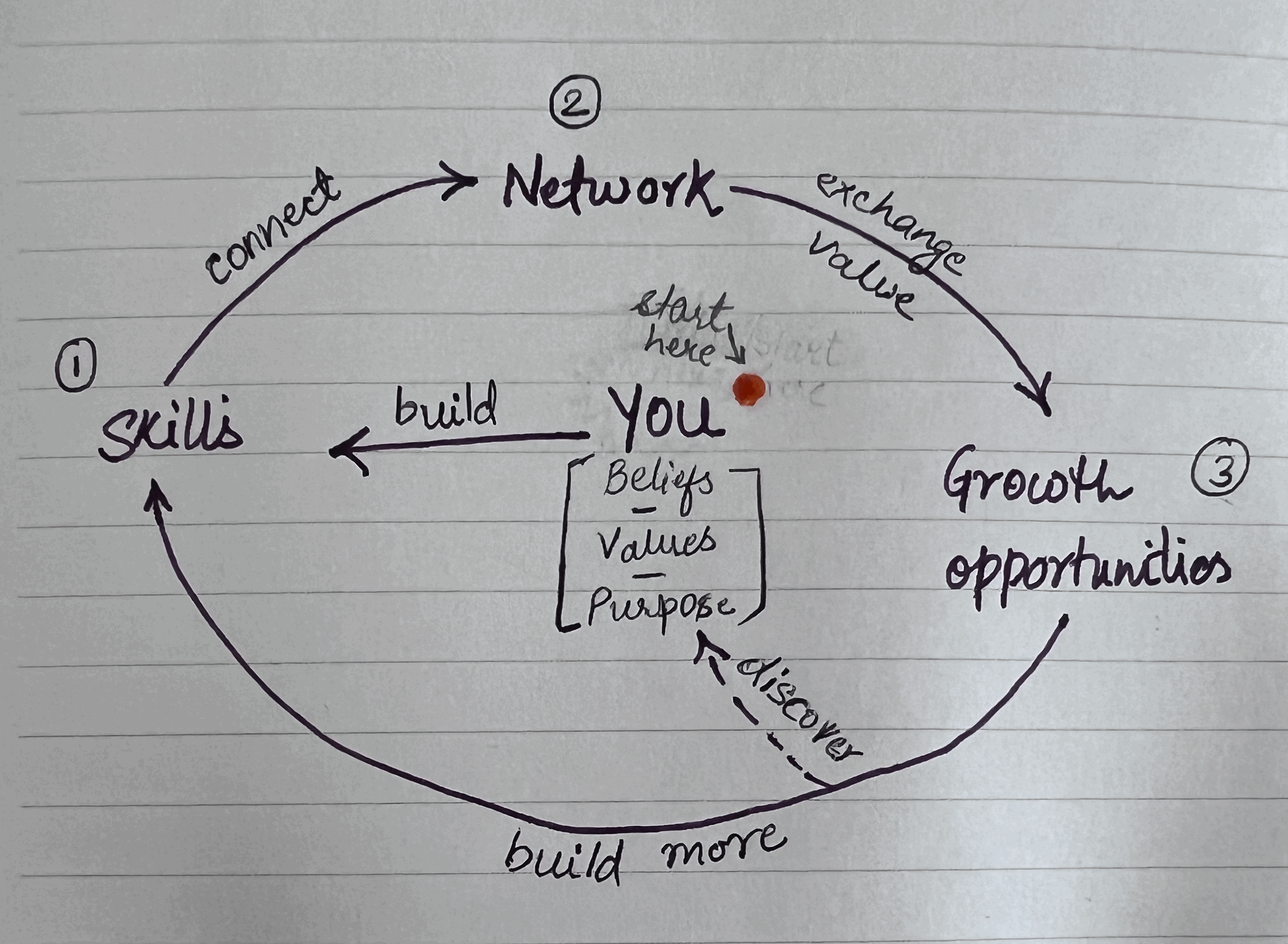Three frequently asked career questions
Networking effectively will get you exposure. And exposure can land that growth opportunity you always wanted. But everything falls flat if you do not build a *unique combination* of skills. So, start there, and everything else comes next.

Earlier this summer, like the rest of the world, my firm hired at a tremendous pace, and we welcomed many entry-level and mid-career professionals into my practice. During the same time, a batch of interns also joined, many of whom interned on my team(s). In my 1-on-1s with these cohorts, newcomers consistently repeated a handful of questions.
Today I am sharing the three (plus one) most frequently asked career questions in consulting environments. The examples and anecdotes are from my workplace, but these concepts apply universally. I hope this helps people who are new to consulting or new to the workforce in general.
Question #1: How can I grow my professional network?
TL;DR: Networking is essential, but you don't need to stress about it right out of the gate. Build your brand first and learn effective networking before you go all in.
In consulting industry, one gets staffed on client engagements based on reputation and brand. Hence, it's essential to be plugged into the networks - knowing others and being known for your skills and interests. For someone in your shoes, it might seem that the easiest way to network is to grab time on people's calendars or attend company events and happy hours to make many connections en masse. I think these are the most dreaded and ineffective networking measures if you do not already have a brand. You can use these methods for quick intros, but they will not get you to the desired outcomes.
When you are new to an organization, first and foremost, you need to establish credibility with your team. Your first few reps will be crucial for your work experience, brand, and relationship capital. At this point, you should spend your energy on building skills and strengthening your first-degree relationships (core team, manager, and director).
Roots grow before fruits. So, focus on establishing a solid footing upon which you can stand to branch out in future.
There is nothing quite effective as word-of-mouth marketing (WOMM), especially for a new brand. Once your first-degree relationships flourish, your manager will talk about you in staffing and performance calibration meetings. Soon, your reputation will precede you. At this point, you can start building your network.
Before you go all into it, put some time into preparing yourself for effective networking. Seek help from your manager and assigned career coach to navigate the firm and get plugged into communities of interest. In the references section, I am linking an actionable guide. It has been authored by Deborah Liu, an author and industry leader whose work I admire a lot. I highly recommend that you read it to learn how to network effectively.
Question #2: What is the best way to get exposure to and seek time from leadership?
TL;DR: Think about it as value exchange; what do you bring to the table, and how can you help leadership drive their agenda? Then offer up your help.
Admittedly, I have struggled with this one quite a lot. Leadership at my firm gives the highest priority to people's development. All the Partners take a keen interest in active coaching and mentoring. But that does not mean I am entitled to it. Time is the most precious resource, and I feel that I have to earn the right to ask for their time. It's rooted in my beliefs and values (thanks, dad) not to take more than I give. Therefore, I feel conscious about infringing on people's calendars. So what do I do? I take the path of least resistance. I offer my help.
The most natural way to get exposure is to work with people. And finding work is super easy - just use these magic words: "How can I help?"
There is so much on everyone's plate, and the leaders would love to delegate it to someone capable, passionate, and interested. So, when you have downtime between client engagements, let your managers/ leaders know that you would like to "reinvest" in the firm. I promise you will be tapped for some business development/ collateral building effort in one hot minute. Once in it, make sure you let them see you in action. Do a tremendously high-quality job. Make them look good.
By virtue of working together, you get first-hand access to the leadership. You get coaching and mentoring on the job, which is always way more valuable than occasional coffee chats. That is how you will build trust-based relationships, find allies and make advocates across senior leadership.
After the work ends, grab time with them. It will feel natural because now you have earned it! See if they can do a quarterly 1-on-1 with you. Make those interactions purposeful, specific, and pertinent to your situation. Lastly, thank them generously for their investment in you. Remember, you are not entitled to it.
Question #3: How do I find exciting growth opportunities?
TL;DR: It's simple, find out what excites you and then ask for it. Opportunities are always around the corner, most often disguised as work.
Assuming you already have a professional network of people you want to work with and have developed trust-based relationships with them. And now you are looking for that growth opportunity. Perhaps it's as simple as wanting to do your manager's job, or you want to try something completely new. In either case, it starts with having candid conversations.
Give your leaders/ coaches/ managers an idea of your interests. Use your 1-on-1 time to have meaningful conversations; cut through the usual surface-level catchup and filler convos and try going one level deep to discuss - What brings you joy at work? What fills your cup? What do you take interest in? What have you been itching to try? What is the new thing you have been reading about?
I am sharing my most recent personal experience to contextualize this for you. I am passionate about Talent Development. So when a Partner (who also happens to be my coach) wanted to create a new training curriculum, they knew I would be interested. They asked me, and, of course, I said Yes in a split second. I drew up a concept map, assembled a team of people interested in helping, and delivered an immersive learning product. It sure was a lot of work, but the impact was far-reaching; I was given the opportunity to present the outcome report to the group of senior partners. I used that presentation to share more ideas and obtained executive sponsorship and support.
From the lens of personal growth, this work taught me a great deal about leading with influence - bringing a group of people together, none of whom reported to me, most of whom were my peers, fusing them into a functional team and rallying support for a collective cause.
Overall, the delivered value was way more than I thought it would be. Now, I must tell you - it did not look like a growth opportunity when offered to me; it looked like "work." But I did it anyway.
The reason most people do not recognize an opportunity when they meet it is because it usually goes around wearing overalls and looking like hard work.
Bonus Question: How did you get here? When did you find your path?
TL;DR: By building a unique combination of skills and being open-minded about the variety of work that came my way. Oh, and I am still "finding my path," so to say.
I came from Big Tech with excellent technical and business acumen but lacked core consulting skills. For the first few years, I focused on closing that gap. I made the best of my client engagements (yes, even the non-exciting ones) and said yes to numerous stretch opportunities to round out my skillset. In the process, I developed a unique combination of transferable skills. With some trial and error, a few happy accidents, and a lot of open-mindedness, I made it this far!
Admittedly, I did not consciously chart a course for myself (I know how unsexy that sounds). I got incredibly lucky to be in work environments where I was supported and challenged to grow and evolve continuously. However, looking forward, I am being more deliberate about what I want to do. Precisely, I am trying to find my ikigai. But what is ikigai, you ask?


I have been using self-reflection and mindfulness techniques to get to this intersection of passion, mission, and profession. I found that drawing mindmaps and journaling helps me in my discovery process. I also have access to an Executive Coach (thanks to my firm, PwC) to help me find these answers. The thing is, finding ikigai cannot be rushed; it takes its own sweet time.
We all are unique and so are our journeys. One can learn tools and tactics from others but we all have to go through the process of charting our unique paths.
I recommend you learn by experimentation, build transferable skills through your work, and spend time finding your ikigai to build a meaningful career with deeper personal significance.
At Last
Networking effectively will get you exposure. And exposure can land that growth opportunity you always wanted. But everything falls flat if you do not build a unique combination of skills.

Your skillset (hard skills + core consulting skills + human skills + leadership skills) is what differentiates you and makes you marketable. It's an asset that you own and take with you. It helps you float through unpredictable and turbulent times (like the times we are in now).
Happy learning, and welcome to Consulting!
I hope you enjoyed reading this. Let me know your thoughts, ideas, and comments. What are the top career questions you have on your mind?
Since you have reached the end of this post, I assume you like my content. If so, click here to subscribe to my newsletter and get my exclusive content.
References
[1] Deb Liu, CEO of Ancestry and Author of Take Back Your Power, explains how to network effectively